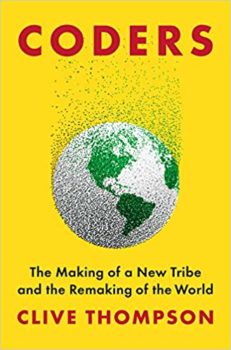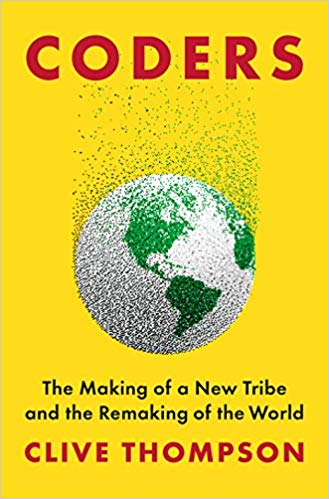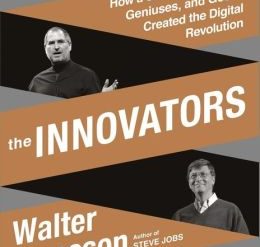
The first computer programmer was a woman. Ada Lovelace, Lord Byron’s daughter, wrote code in 1842-43 for Charles Babbage‘s Analytical Engine, a computer that was never built. And a century later, when the first digital computers finally came into existence, the programmers were mostly female. In fact, women continued to dominate the field well into the 1960s. Only then did men begin to find the job attractive. Today, of course, coding—a trendier name for computer programming—is overwhelmingly male. And some men even make the outrageous and easily refuted claim that women are genetically unsuited to the field.
Estimated reading time: 5 minutes
The shifting roles of women and men in the software industry
In his riveting new book, Coders, journalist Clive Thompson traces the history of the computer industry and reviews the shifting roles of the women and men who write the instructions that govern the machines. He also examines the industry’s heavily skewed ethnic mix, with white and Asian men now holding the majority of the jobs. The picture Thompson paints is unflattering, to say the least.
Coders: The Making of a New Tribe and the Remaking of the World by Clive Thompson (2019) 448 pages ★★★★★
When women programmers dominated, “the coding back then was harder than today’s programming”
“[I]f women’s biology made them temperamentally unsuited to coding—and uninterested in it,” Thompson writes, “it’s difficult to explain why they were so prominent in the early years of American programming. After all, the coding back then was, if anything, harder than today’s programming.” And the logic, or rather the lack of it, that keeps larger numbers of African Americans and Latinos out of the field is even less persuasive. So, why is the industry so heavily skewed toward young white males? Thompson attributes this, in part, to the “frat-like nature of tech start-ups.” And he notes, quoting the former head of the Wikimedia Foundation, “‘it’s not that women are excluded. It’s that practically everyone is excluded if you’re not a young white man who’s single.'”
A cold, hard look at the software industry
Given this reality, why should we care? Thompson’s explanation is compelling. “Programmers are . . . among the most quietly influential people on the planet. As we live in a world made of software, they’re the architects.” And their biases work their way willy-nilly into their work, which sometimes leads to tragic consequences. For example, the artificial-intelligence-based software used today in many court systems to screen prisoners for bail, probation, or diversionary treatment has been well-documented to discriminate against prisoners of color.
Why? Because the limited data on which its decisions are based simply reflect the racist outcomes of the past. (“ProPublica found that [the software] was almost twice as likely to label a black defendant as getting a high-risk recidivist score than a white defendant, even when they controlled for these defendants’ prior crimes, age, and gender.”) And because the programmers who created and tweak this software weren’t sensitive enough to this problem to find ways around it.
The politics of Silicon Valley is widely misunderstood
In Coders, Thompson also explores the political attitudes prevailing in Silicon Valley’s leadership. It’s widely believed, of course, that libertarian sentiment is widespread in those quarters, and that’s certainly true of some of the Valley’s wealthiest entrepreneurs and venture capitalists. Ironically, however, the impulse to oppose all government influence on the computer industry is far off base. “When R&D magazine surveyed the top innovations from 1971 to 2006,” Thompson reports, “they found 88 percent had been funded by federal research dollars.” Even the Internet itself was a product of government funding—decades of it. And, despite the widespread belief that libertarianism is dominant in Silicon Valley, Thompson relates the findings of several studies that show the industry is overwhelmingly liberal and Democratic.
A wealth of insight about the software industry
Coders offers a wealth of information and insight about the world that software is building for us. For instance:
- Thompson briefly explores the history of artificial intelligence. He debunks the most extreme fears AI has engendered (“‘Worrying about killer AI,'” one expert told him, “‘is like worrying about overpopulation on Mars.”) But there are far more serious problems emerging. Among them are the inability of facial-recognition software to recognize the faces of people of color. Why? Again, because the dataset on which the programs’s decisions are based is far too limited.
- Like people in any profession, Silicon Valley’s top coders mystify their work, implying that only those with peculiar genius and uniquely adapted personalities can handle the job. In refuting this assumption, Thompson reports on a program in Lexington, Kentucky, that is successfully retraining coal miners as coders. “‘Coal miners are really technology workers that get dirty,'” the program’s founder insists. And Thompson sees much more broadly the emergence of “blue-collar coding.”
Women programmers, blue-collar coders, and the world they’re building
This development is emblematic of the growing divide between the elite coders in the major tech firms, who often earn high six-figure incomes, and those who work in ever-increasing numbers on the routine maintenance of software in industry and commerce throughout the country. The work pays well enough, promising “a middle-class stability of the sort that has increasingly vanished from the American economic landscape.” But those “blue-collar coders” are, like others in blue-collar jobs, a class set apart. And, Thompson believes, it’s only the beginning: “Blue-collar code will emerge, it seems; but so will pink- and white-collar.”
For related reading
I’ve reviewed several books on related subjects, including:
- Troublemakers: Silicon Valley’s Coming of Age by Leslie Berlin (The people who put Silicon Valley on the map);
- The Big Nine: How the Tech Titans and Their Thinking Machines Could Warp Humanity by Amy Webb (An artificial intelligence skeptic paints a chilling picture of a future dominated by AI);
- Chaos Monkeys: Obscene Fortune and Random Failure in Silicon Valley by Antonio Garcia Martinez (Confessions of a Silicon Valley techie);
- Code Girls: The Untold Story of the American Women Code Breakers of World War II by Liza Mundy (The amazing story of the American “Code Girls” who helped win World War II); and
- AI Superpowers: China, Silicon Valley, and the New World Order by Kai-Fu Lee (The best book about artificial intelligence I’ve read so far).
You might also be interested in my posts, My 10 favorite books about business history, Two dozen good books about artificial intelligence, and 5 best books about Silicon Valley.
And you can always find my most popular reviews, and the most recent ones, on the Home Page.


























